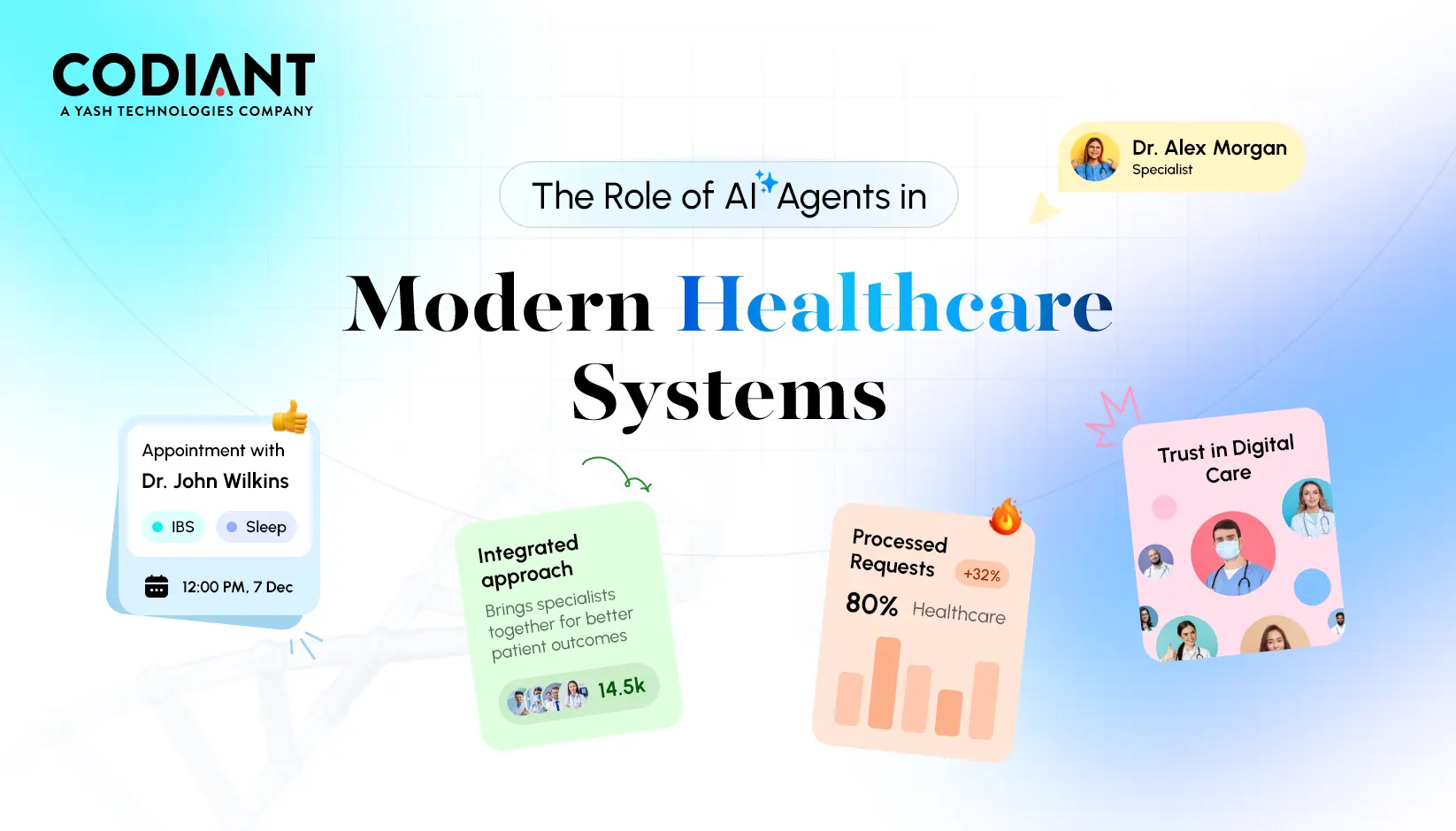How Conversational AI is Reshaping the Customer Experience
Table of Contents
Subscribe To Our Newsletter

Customers demand seamless, personalized, and convenient interactions with leading brands. Failing to meet these expectations can lead to customer frustration and missed opportunities. Conversational AI offers a way to address these demands by providing efficient and effective customer support and engagement. This technology encompasses a wide range of automated systems that can hold natural language conversations with users.
Businesses can potentially save between 15% and 70% on costs based on the number of customer channel interactions redirected to Conversational AI-enabled chatbot development.
AI Chatbots, voice recognition systems, and virtual assistants providing round-the-clock support, all come under conversational AI.
Amazon’s Virtual Assistant Alexa is a prime example of how conversational AI has transformed the customer experience. Alexa is embedded in smart devices. It helps allow users to monitor their environment, access information, and shop online with natural language commands.
- Conversational AI uses AI technology and natural language processing (NLP) to enable machines to understand, interpret, and respond to human language.
- Conversational AI is now considered as an integral part of customer service, marketing, and sales strategies across diverse industry verticals.
- It allows machines to communicate naturally with humans either through text or speech.
Besides, the conversation AI market has witnessed significant growth and adoption in the last 5 years. 90% of companies that use AI chatbots for customer service save up to 4 minutes per question and only pay $0.70 per interaction.
Key Components of Conversational AI
Conversational AI systems consist of several key components:
- Natural Language Processing (NLP)
This component enables the system to understand and interpret human language. It includes context, sentiment, and intent. - Machine Learning (ML)
ML algorithms are used to improve the system’s performance and responses over time. They allow the AI to learn and adapt. - Dialog Management
This part controls the flow of the conversation. It ensures that the interaction remains coherent and contextually relevant. - Integration
Chatbot development in Conversational AI supports integration with various data sources and systems to retrieve information and provide valuable responses.
Unlock the Advantages of Conversational AI
Conversational AI offers numerous advantages, including:

- Efficiency
It’s like having a super-efficient assistant. Conversational AI can take care of repetitive tasks and answer common questions, reducing the need for human intervention. This means businesses can save time and money while you get faster responses. - Availability
24/7 availability for customer queries, irrespective of time zones or working hours.
You don’t need to worry if you need help from a company and it’s the middle of the night. Conversational AI is available 24/7, ready to assist you. It doesn’t take breaks or need sleep, making it ultra-convenient for you. - Personalization
Conversational AI is like having a personal shopper. Conversational AI can remember your preferences and past interactions. This way, the AI Chatbot can suggest products or services that you’re more likely to enjoy, making your experience more personal and enjoyable. Further, chatbot development in AI gives added benefits to tailored responses and product recommendations. And, these are based on user data and preferences. - Scalability
Conversational AI has the ability to handle a high volume of conversations simultaneously. Whether it’s a slow day or a super busy one, it can keep up without breaking a sweat. This helps businesses serve more customers efficiently. - Data Insights
Gathering valuable data and insights from conversations. It helps in decision-making and improving processes.
Read More: Which is Better for Your Business in 2025- Chatbots or Conversational AI?
The Role of Conversational AI in Customer Experience

- Always There to Help
Imagine you have a question or need assistance from a company, but it’s 2 A.M., not a suitable time to call, right? Conversational AI doesn’t sleep. Conversational AI systems operate around the clock. It’s available 24/7 to help you. This means you can get AI Chatbot support or information when it’s convenient for you.
This is particularly valuable for global businesses with customers in different time zones. Immediate responses to inquiries, issues, or orders contribute to a positive customer experience.
- Faster Responses
People are used to waiting on hold or waiting for an email reply. Conversational AI can answer your questions instantly. No more elevator music or anxiously checking your inbox. AI Chatbot is like having a super-fast customer service agent at your fingertips. - Personalized Service
Have you ever noticed that some websites recommend products you might like? That’s Conversational AI and chatbot development at work. It can look at your past interactions and figure out what you might be interested in. Thus, you will get personalized recommendations and offers. This level of personalization enhances customer engagement and makes customer experience more enjoyable. Also, it fosters a stronger connection between the customer and the brand. - Multichannel Support
Conversational AI isn’t limited to just one way of talking. Conversational AI can seamlessly operate across various communication channels. It can chat with you on a website using a messaging app, or using your voice through smart speakers like Alexa or Google Assistant.
Hence, you can reach out to your customers in the most comfortable way.
- Handling Repetitive Tasks
What if you work in a customer support team and you need to answer similar questions 100-200 times a day? Isn’t it a tiring process? Well, Conversational AI doesn’t get tired. AI Chatbot is great at handling repetitive tasks. It can answer common questions such as “What’s your return policy?” without getting frustrated. - Learning and Getting Better
Conversational AI is like an intelligent student who continues to learn. It can learn from every conversation. If you don’t know the answer to something, you can learn from AI chatbots and get better next time. This means that it is constantly improving, which will benefit you.
Further, Conversational AI is not just a chat; it’s a transformation. It is doing its magic across industries, making processes smoother and customer experiences more delightful.
How Conversational AI is Working for Various Industries?
Conversational AI is revolutionizing diverse industries, from healthcare to e-commerce. It offers personalized support, enhances efficiency, and improves customer interactions.

- Healthcare
Chatbot development in conversational AI helps schedule appointments, provide medication reminders, and answer general health-related questions. These systems are also utilized for patient engagement, allowing healthcare providers to maintain a continuous dialogue with patients. - Banking and Finance
AI-based chatbot development is providing customers assistance with balance inquiries, fund transfers, bill payments, and even investment advice in bans and other financial institutions. It enhances security by enabling two-factor authentication through voice recognition. - E-learning
Conversational AI enhances the learning experience. It provides instant answers to student questions, delivers personalized study recommendations, and offers interactive lessons through virtual tutors. - Travel & Hospitality
In the travel and hospitality sector, Conversational AI facilitates hotel reservations, flight bookings, and journey management. The chatbot development in AI can also answer travel-related queries, give local recommendations, and offer caretaker services through virtual assistants. - Telecom
Telecom companies use AI chatbots for customer support, troubleshooting, and account management. AI Chatbot can help customers with network issues, billing inquiries, and plan customization. - E-commerce & Retail
AI Chatbot development is the most suitable option in the retail and e-commerce industry. Conversational AI is used for personalized product recommendations, order tracking, and customer support. AI chatbots and virtual assistants help customers find products, assist with checkout processes, and address inquiries promptly.
While Conversational AI brings great benefits, challenges do exist and need careful attention for its successful implementation.
Challenges to Overcome While Implementing Conversational AI
- Data Privacy and Security
Ensuring customers that their data is private and secure is one of the key challenges during the implementation of conversational AI. Organizations must implement strong data protection policies to prevent sensitive data and comply with data protection laws. - Integration with Existing Systems
Integrating AI Chatbot with existing IT systems and databases can be complex. Ensuring that the AI system can access the necessary information in real time and provide accurate responses is essential for a seamless customer experience. - Design and User Experience
The design and user experience of Conversational AI interfaces play a crucial role in customer satisfaction. Designing user-friendly and intuitive interfaces that customers find easy to use and navigate is essential. - Ethical Concerns
Chatbot development in AI becomes more human-like in its interactions, ethical concerns arise. Businesses must ensure that their AI systems are designed and used responsibly, addressing issues such as bias, discrimination, and transparency in AI decision-making.
It’s not just AI; it’s your future assistant. Conversational AI is shaping the way we interact with technology and services.
The Future of Conversational AI
The future of conversational AI holds endless possibilities, from even smarter interactions to seamless integration in our daily lives.
- Advancements in NLP and ML
Continued advancements in natural language processing and machine learning will lead to more sophisticated Conversational AI systems. These systems will understand context, sentiment, and intent. It results in even more human-like interactions. - Humanizing AI
The future of Conversational AI and chatbot development involves humanize AI technology. This includes giving AI systems a personality, enhancing emotional intelligence, and making interactions feel less robotic. Humanized AI will contribute to more authentic and engaging customer experiences. - Adoption & Integration
The adoption of chatbot development and related AI-based development is expected to grow across various industries. Integration with AR and VR technologies will expand the possibilities for enhancing customer experiences.
Conversational AI is not merely a passing trend, but rather a transformative revolution that will persistently progress and broaden in the forthcoming years.
In essence, it is reshaping the customer experience by equipping businesses with the means to offer exceptionally tailored, streamlined, and captivating interactions with their clientele.
Frequently Asked Questions
AI is going to totally revolutionize how companies interact with their customers, my friend. Imagine being able to get fast, personalized support anytime, anywhere from a virtual assistant that truly understands your needs. No more waiting on hold or being passed around to different agents!
With AI, companies can provide extraordinarily smart self-service options and instant resolutions to common requests. But it also allows human reps to focus on the more complex, high-value interactions. AI can surface relevant info at just the right time to equip agents to really go above and beyond. It’s about using technology to augment and enhance those human strengths.
In today’s world, people want to engage with businesses the same way they do with others – through natural conversations. Conversational AI allows companies to communicate with customers exactly that way through voice assistants, chatbots, messaging apps and beyond.
It’s all about creating experiences that feel personalized, intelligent and true-to-life. Rather than being forced through clunky menu trees and fill-in forms, you can simply ask for what you need using normal language. The AI assistant then understands context and intent to guide you properly. It makes everything more organic and effortless.
Where do I start? AI support assistants can provide answers 24/7 without any wait times. They have unlimited patience to walk customers through issues step-by-step. Their responses are always consistent and on-brand. And they can instantly self-learn and improve over time.
AI can instantly analyze patterns across millions of interactions to spot issues before they become fires. It can precisely route requests to the right skillset. It means major cost savings while still delivering incredible experiences.
But most importantly, AI empowers human agents to be their best selves. By handling repetitive tasks, surfacing relevant info and taking inquiries as far as possible on its own, AI allows agents to own more rewarding and impactful conversations.
Chatbots are rapidly becoming the front door to incredible customer experiences. These AI assistants can converse with customers anytime, anywhere across messaging apps, websites, smart devices – you name it. And the experiences they deliver feel natural, personalized and intelligent.
A great chatbot seamlessly blends the speed and accessibility of self-service with the intelligence and empathy of human support. It can handle simple FAQs and tasks all on its own via conversational AI. But it also knows when to loop in a real agent for more complex queries, while providing key context.
That scalability and flexibility to automatically navigate between self-service and live support is huge. It ensures customers always have the fastest path to resolution tailored to their specific needs in that moment. No wonder chatbots are so vital for driving affordable, effortless, yet great experiences at scale.
Featured Blogs
Read our thoughts and insights on the latest tech and business trends
How AI Agents Transform the Healthcare Sector?
- January 19, 2026
- Artificial Intelligence
In a Nutshell AI agents in healthcare go beyond automation by acting autonomously, learning continuously, and orchestrating workflows end to end not just generating insights. Agentic AI shifts healthcare from reactive to proactive, enabling early... Read more
Top 20 AI Development Companies in USA in 2026
- January 14, 2026
- Artificial Intelligence
In a Nutshell: The AI development companies USA businesses trust most are those that deliver production-ready AI, not just proofs of concept or demos. The best AI development companies USA combine AI engineering with full-stack... Read more
How Much Does It Cost to Develop an App in 2026? A Detailed Guide
- January 12, 2026
- Mobile App Development
If you’re planning to launch an app in 2026, you’re probably asking the same question every founder, product head, and business owner asks first: how much does it cost to develop a mobile app in... Read more




